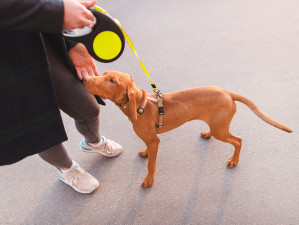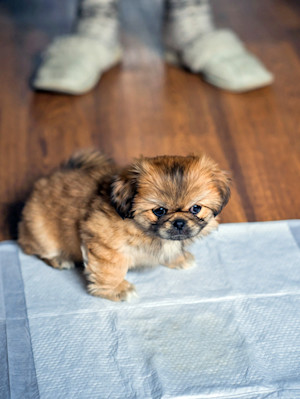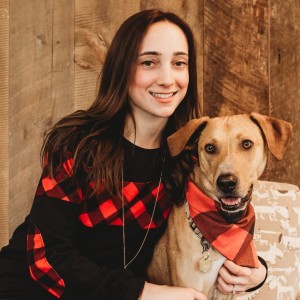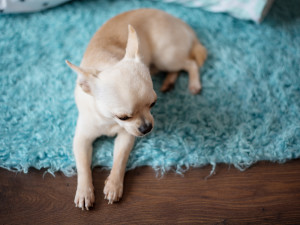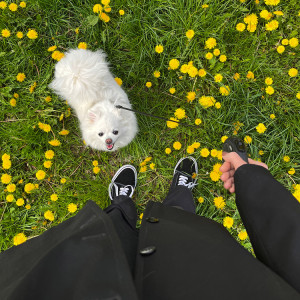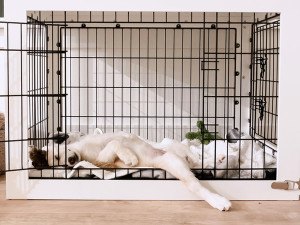Why Does My Puppy Pee on My Bed?
And when will it stop?
In This Article:
Why Is My Puppy Peeing On My Bed? When to Seek Professional Help How To Potty Train A Puppy
There are many different reasons why your puppy might pee on your bed, and understanding the underlying reasons will determine how you treat the issue.
Why is my puppy peeing on my bed?
Not only can puppies have accidents on your bed, but adult dogs may, too. One important thing to remember is that dogs are not spiteful and do not pee on your bed to make you mad.
First, you want to think about the age of your dog. Do you have a very young puppy or an older dog? If your young puppy sleeps in your bed and is not potty trained yet, they may have accidents because they can not hold their bladder or they do not yet understand how to tell you they need to go out.
How much do you spend on your pet per year?
Crating your puppy at night will help prevent accidents in your bed and help develop good potty training skills. If you insist on sleeping with your puppy (who could blame you, they are so darn cute!), be sure to take your them out if you notice they got up in the middle of the night, are moving around. or seem uncomfortable. If you are a heavy sleeper, be sure to set an alarm to take your puppy out in a timely fashion to prevent night time accidents until your puppy can hold it and is potty trained.
If your dog is older, they may be getting to the point where they have incontinence and can no longer hold their bowels, and investing in dog diapers may be helpful in this situation.
When to seek professional help
Is this a new behavior for your dog? This may warrant a vet visit! If your dog is exhibiting unusual urinating behaviors that you have not witnessed before, they may have a urinary tract infection or something that may need to be treated with medication. It is best to reach out to your vet and make an appointment to help treat the underlying cause.
Once you know your dog is healthy, you may want to think about these other reasons your dog may exhibit the behavior of peeing on your bed.
Have you changed your sheets recently? Dogs have a sensitive sense of smell, and bed sheets are heavily covered with our scent. Your dog may be marking the bed to add their smell to the space as well. If you are unsure if it was an accident or marking behavior, observe how much urine was left.
Typically, when a dog marks, it is much less urine than an accident. If your dog marked your bed, be sure to clean it so there is no residual smell. A residual smell may cause your dog to urinate there again. Once you have cleaned and treated the accident, it’s a good idea to cover it with baking soda for a few hours or overnight. This will help absorb any leftover odors.
How to potty train a puppy
Just like humans, dogs can be sensitive to change. Is there a new baby in the home? Did your schedule change because of a new job? Is there loud construction going on somewhere nearby? These are all things that can cause stress to your dog. Stress can cause a dog to exhibit behaviors that they have not exhibited in the past. Here are some ways to help them if they are stressed out.
Have you noticed your dog pees on the bed when only a certain member of your household is present? This may be a result of submissive urinating or excited urinating. Submissive urination is a result of fear. If you have a family member who is known for scolding a dog or puppy, they may pee in submission when around that person. If this happens, try to create positive associations with that person.
Excited urination is quite the opposite. Is there someone in your household who comes into the room at a level of 100 percent, overly exciting your dog, using all the fun baby noises, and riling the dog up? This level of excitement may cause your puppy to urinate, and if they were on your bed when that person came in, then you may be left with a soiled bed. Have a conversation with this person, and ask them to come into the area calmly, ignoring the dog for a few minutes, until they have calmed down. Excited urination may go away as your puppy can hold their bladder more.
As always, if the issue persists, it is best to consult a veterinarian or dog trainer to help with the undesirable behavior.
FAQs (People also ask):
How often do puppies need to go out?
Puppies need to go out frequently. At night, if you are a deep sleeper, be sure to set an alarm to take your puppy out in a timely fashion to prevent night time accidents.
Why does my puppy pee when I pet them?
If your puppy pees when you pet them, they may be experience either submissive or excited urination. Submissive urination occurs when someone they are afraid of interacts with them, while excited urination occurs when your puppy is overstimulated, and needs to be calmed down.
Should I punish my dog for peeing in my bed?
It’s important to remember that dogs aren’t spiteful, and they aren’t purposefully peeing on your bed in order to make you mad. After you dog pees in your bed, make sure to clean the area, covering it with baking soda for a few hours or overnight in order to absorb the scent.



